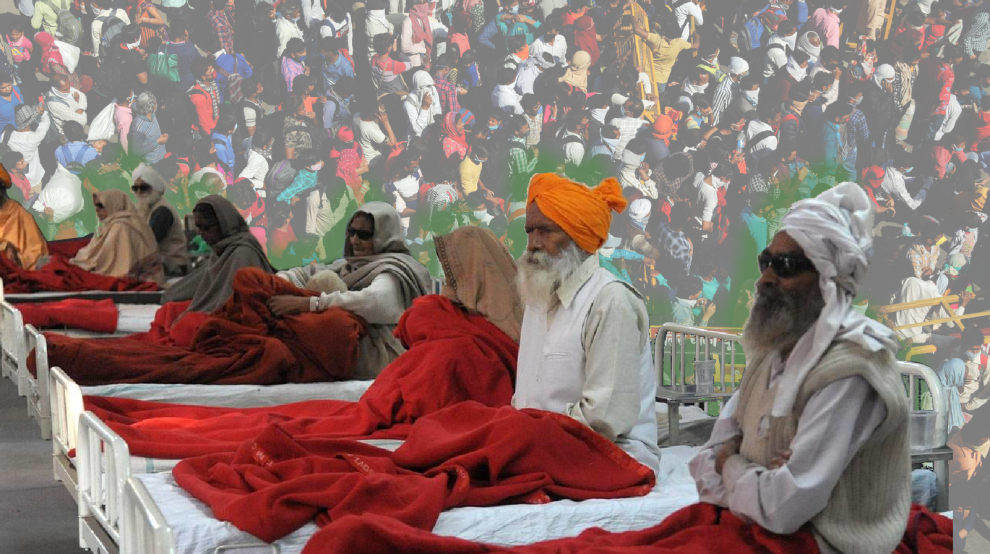India’s medical facilities are coming under growing pressure as coronavirus cases rise sharply despite a nationwide lockdown to contain the pandemic.
The crisis has brought to the fore the issue of under-investment in the public healthcare system whereas private hospitals have enjoyed exponential growth.
With about 82,000 confirmed COVID-19 cases, India on Friday looked set to reach six-digit figures soon, and if the current rate of infections continued its hospitals might become burdened with patients.
“If we can contain the number of cases below 100,000, we should be in a good situation. One positive news is that most cases in India are mild to moderate who do not need ventilators,” said Dr Amarinder Singh Malhi, a former president of the Resident Doctors Association at the All India Institute of Medical Sciences (AIIMS) in New Delhi.
AIIMS is India’s premier public health facility and one of the most famous hospitals handling coronavirus patients.
Dr Harjit Singh Bhatti, president of the Progressive Medicos and Scientists’ Forum, said some states have managed the pandemic well while many have struggled.
“India’s most powerful tool was the lockdown, but it did not produce the desired results. We are still not able to flatten the curve. (And) the lockdown cannot continue forever,” Bhatti told Bernama.
“Till now we do not have local epidemiological data and a general patient profile so that healthcare workers can understand the common symptoms and treat people better,” he said.
The shutdown, which began on March 25, should have been better used for expanding treatment facilities and recruiting healthcare workers, Bhatti said.
The shortage of trained staff gets worse when medical workers themselves become infected with the virus.
“We face a staff shortage because every 12th health worker in Delhi is positive. Even if we have ventilators, we need more trained staff to operate them,” Bhatti said.
In the early days of COVID-19, doctors and nurses complained about a lack of testing kits, masks and personal protective equipment (PPE), as well as the social stigma that made them all suspected coronavirus carriers.
“Now we have medical tools available and we do not expect shortages. What we need is more medical literacy among people. They should wear masks, follow social distancing, and cooperate in contact tracing,” Malhi of AIIMS told Bernama.
As the government tried to raise public awareness about the virus, many Indians initially reacted with panic and fear.
Coughing sounds and messages instructing people to wear face masks and stay at home were used as the default caller tunes for phones.
Police checkpoints sprang up across the country to keep most of the country’s 1.3 billion people indoors.
DOCTORS FACE DISCRIMINATION
There have been reports of medical professionals being denied rental accommodation and people practising social distancing with them in unpleasant ways rather than appreciating their work.
“There is ignorance. People should behave in a responsible way and treat medical workers with respect,” Malhi said.
India’s COVID-19 cases are expected to peak in June or July, according to medical experts.
Some of the harshest restrictions on people’s movement and business activity during the lockdown are likely to be eased in the coming days to avoid an economic and social meltdown.
At the same time, the spike in coronavirus cases has to be contained to avert a healthcare disaster.
About 19,000 confirmed cases have been reported since Sunday.
Health Minister Harsh Vardhan said India has so far conducted almost two million tests and ramped up its testing capacity.
“We have now developed a capacity to conduct 100,000 tests per day. Today marks an important milestone as we have tested nearly 20 lakh (two million) tests for COVID-19 at more than 500 laboratories including 359 government laboratories and 145 private laboratories in the country,” he said on Thursday.
Healthcare service standards are uneven in different states and a shortage of funding, equipment and staff remain a chronic problem and prestigious institutions like AIIMS are overburdened with healthcare service demand.
“AIIMS is well-funded and always prepared for medical emergencies, but it can’t be used as an example to say that healthcare all over India is good,” Bhatti said.
India has 7,740 public healthcare facilities in 483 districts, offering 656,769 isolation beds, according to the Ministry of Health.
The number of intensive care unit (ICU) beds is 34,076, while 305,567 are available for confirmed cases, 351,204 beds are for suspected cases, and 99,492 have oxygen support.
Source: bernama.com








